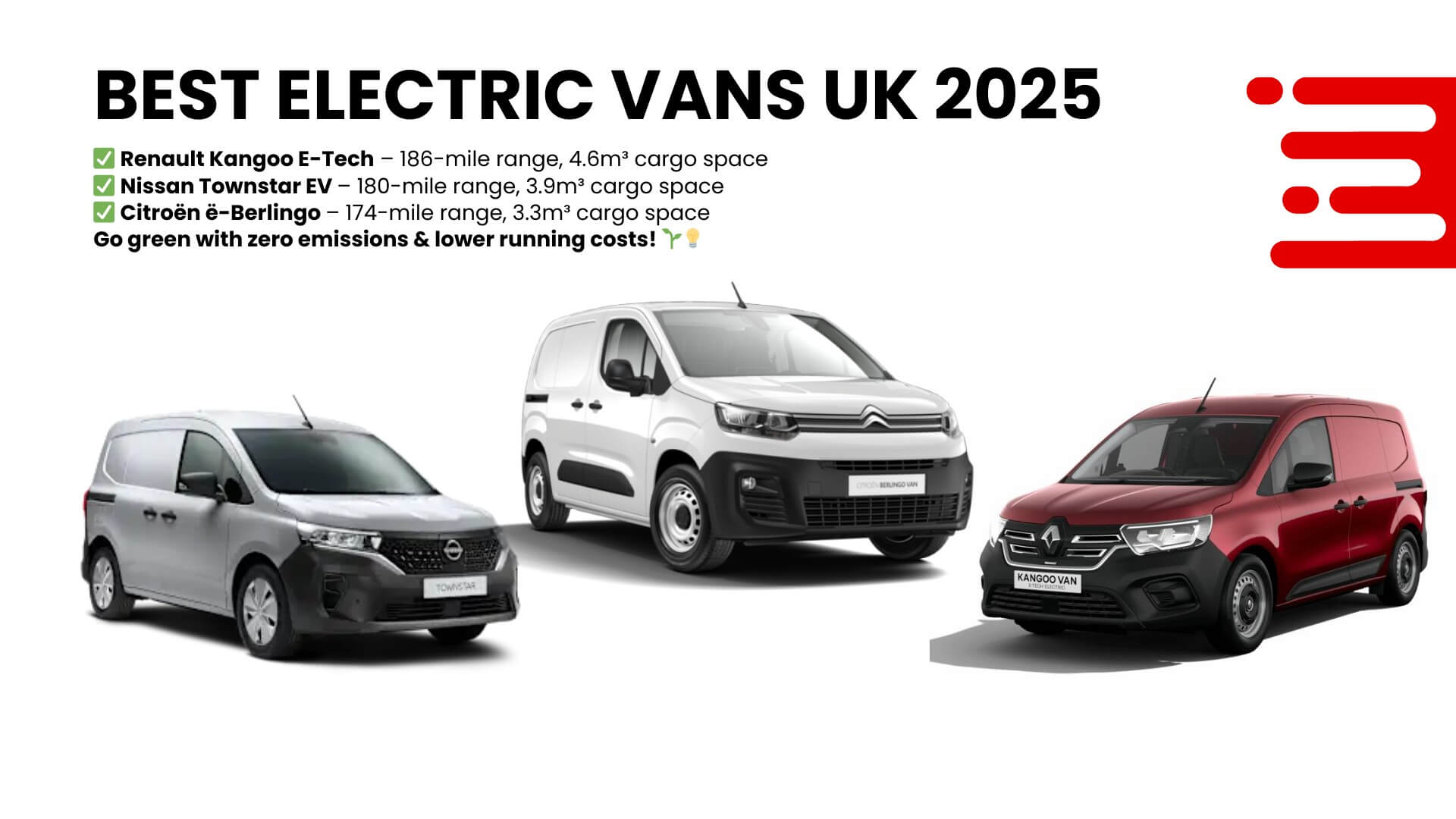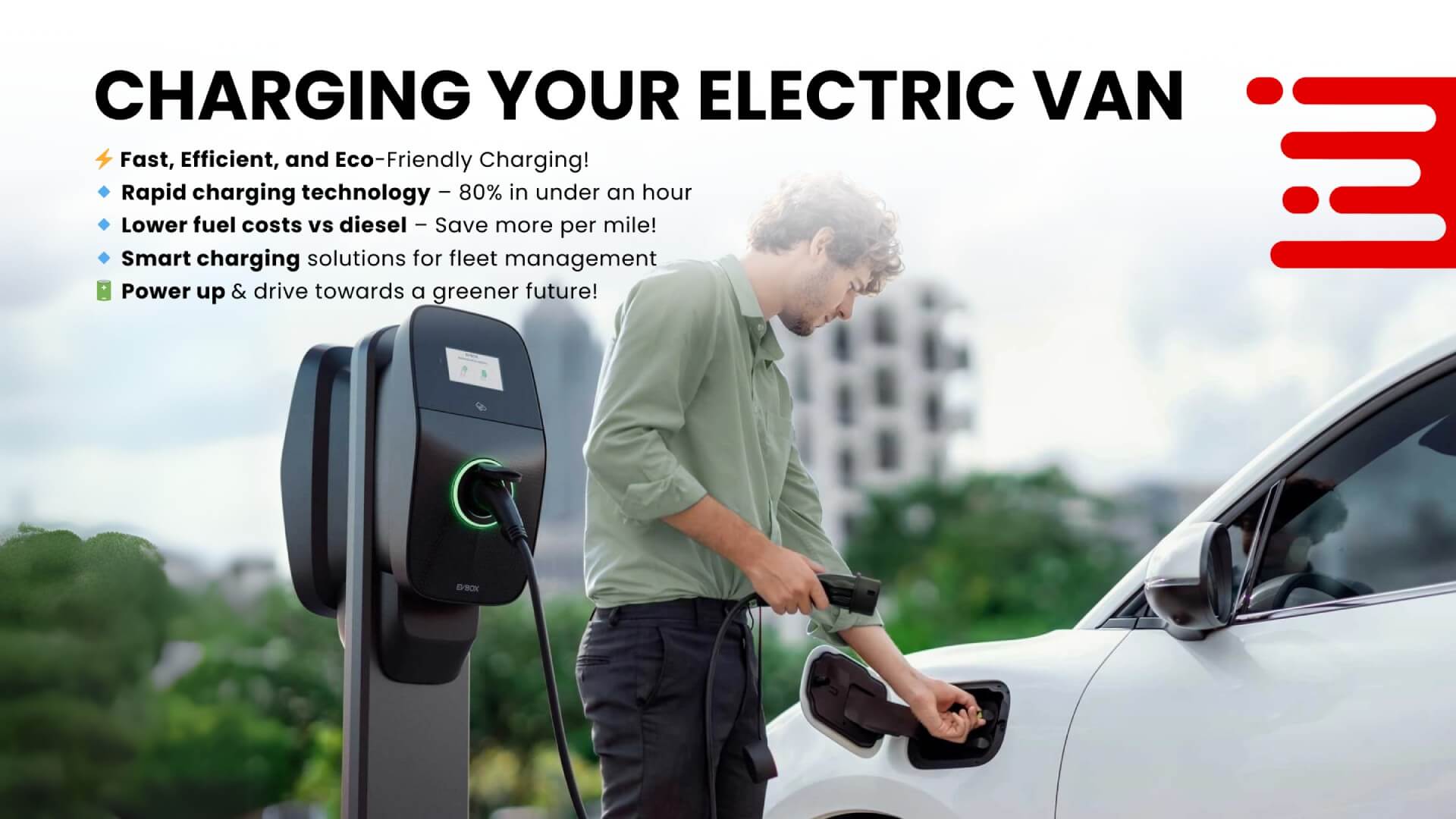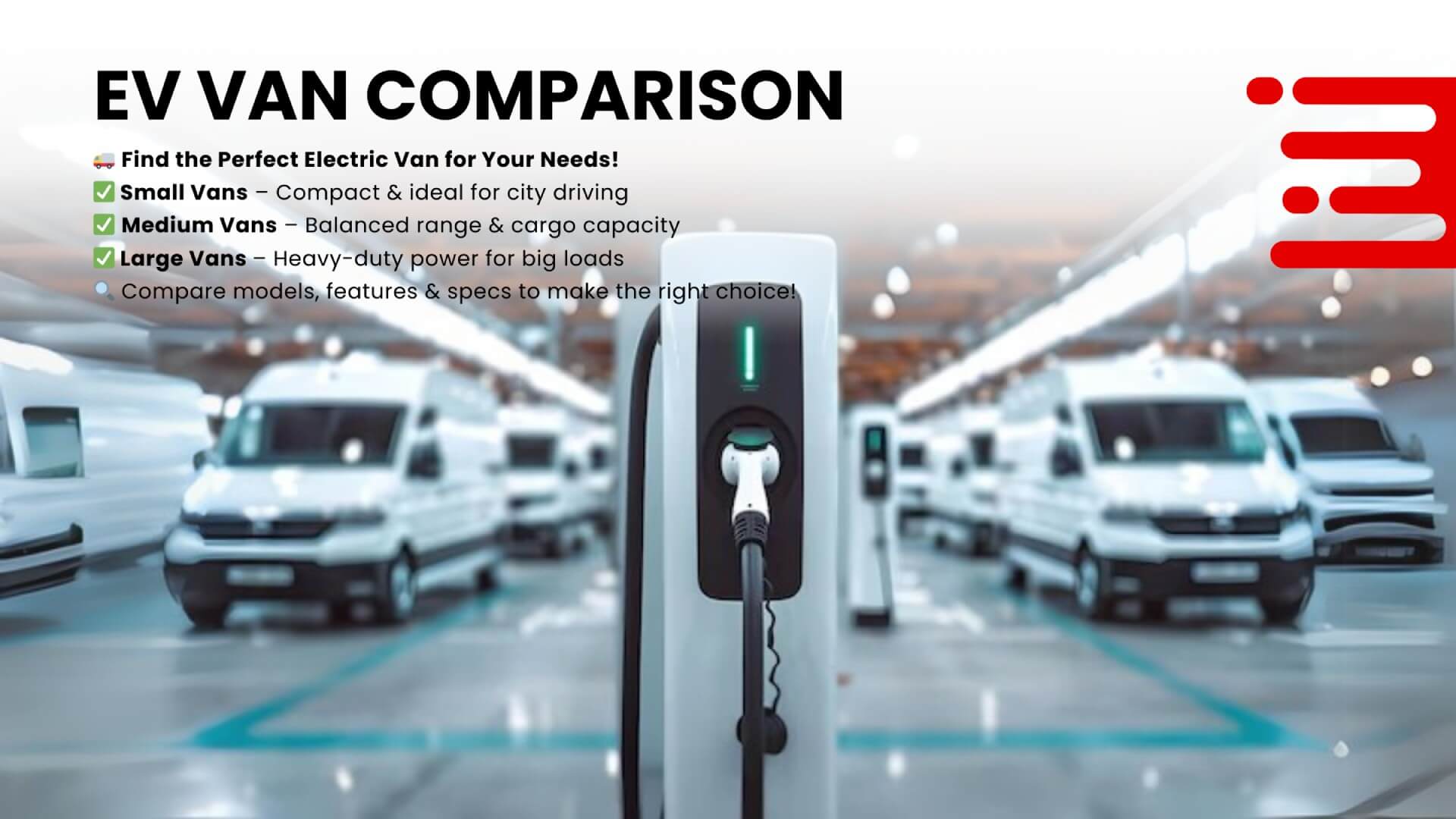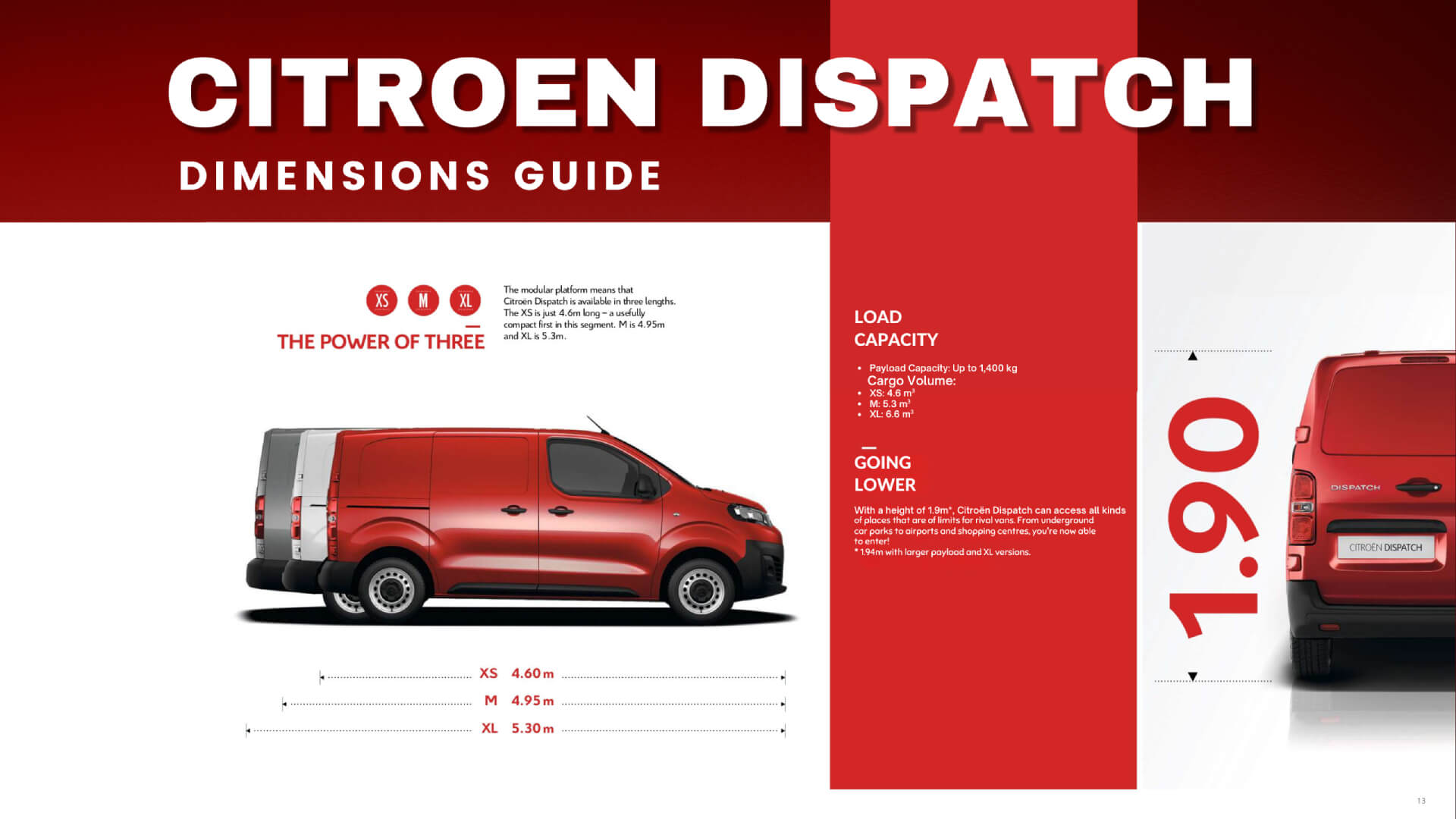Blog
Best Electric Vans UK 2025: A Complete Buyer’s Guide
As the demand for eco-friendly solutions increases, electric vans have emerged as a top choice for businesses and individuals alike. In 2025, electric vans offer a sustainable, cost-efficient alternative to traditional fuel-powered vehicles. With the growing pressure to reduce emissions and government incentives supporting greener choices, electric vans are becoming an attractive option for both urban driving and commercial use.
In this guide, we’ll explore the best electric vans in the UK for 2025, covering key buying considerations, top models, and their features. We’ll also highlight the benefits of electric van ownership and UK incentives, plus tips on enhancing your van with Electric Van Accessories. Be sure to take advantage of UK EV Grants & Incentives to save on your purchase.
1. Why Choose an Electric Van in 2025?

Electric vans are rapidly becoming the preferred choice for businesses and individuals due to their significant benefits. They offer zero emissions, which contributes to a cleaner environment. Additionally, electric vans have lower running costs, especially when it comes to fuel and maintenance. Government incentives and reduced congestion charges further enhance their appeal, making them an excellent choice for those looking to save money while contributing to sustainability.
1.1 Cost Savings: Are Electric Vans Cheaper Than Diesel?
When comparing electric vans to diesel models, electric vans offer substantial cost savings in several areas. Fuel costs are significantly lower for EVs, with electricity being far cheaper than diesel on a per-mile basis. Maintenance is also less costly, as electric vans have fewer moving parts and don’t require services like oil changes. On top of that, EV owners benefit from tax incentives, including exemptions from road tax and reduced toll charges in Clean Air Zones (CAZ).
1.2 Government Grants & Incentives for Electric Vans
The UK government provides various grants and incentives for electric van buyers, making the transition to electric even more affordable. The Plug-in Van Grant (PiVG) offers a discount on the purchase price of eligible electric vans. Additionally, electric vans are exempt from road tax, and owners can save on Clean Air Zone charges, which can significantly lower the overall cost of ownership.
2. Best Electric Vans in the UK for 2025

Choosing the right electric van for your business or personal needs is crucial in 2025, as battery technology continues to improve, and government incentives for electric vehicles (EVs) grow. Here’s a comprehensive list of the best small, medium, and large electric vans for 2025, based on factors such as battery range, charging speed, payload capacity, and towing potential.
2.1 Top Small Electric Vans for Urban Driving
For city driving, compact electric vans provide excellent manoeuvrability, reduced emissions, and enough cargo space to meet everyday needs. These vans are especially well-suited for urban deliveries, short commutes, and businesses that need to navigate tight city streets. Top picks include:
Renault Kangoo E-Tech
This small electric van is perfect for those who need both space and efficiency. With a range of up to 186 miles on a full charge, it’s well-suited for daily city commutes or deliveries. Its compact size makes it easy to manoeuvre through busy streets, while its 4.6m³ cargo space offers ample room for goods. The Kangoo E-Tech’s low running costs and environmental benefits make it an attractive choice for city businesses.
Nissan Townstar EV
Nissan’s Townstar EV brings practicality to urban driving, offering up to 180 miles of range on a full charge. It’s equipped with fast-charging capabilities, meaning you can get back on the road quickly. With 3.9m³ of cargo space, the Townstar EV is ideal for tradespeople or small businesses that need both efficiency and storage. Its small footprint and modern tech features also provide a comfortable, responsive driving experience.
Citroën ë-Berlingo
A long-standing favourite in the small van market, the ë-Berlingo provides up to 174 miles of range on electric power. Its 3.3m³ of cargo space is perfect for light commercial use, while its smooth driving experience ensures easy handling in tight urban environments. It also comes with advanced driver assistance systems, making it a safe and convenient choice for city driving.
2.2 Best Medium-Sized Electric Vans for Business Use
Medium-sized electric vans are ideal for businesses that need a balance of performance, range, and cargo capacity. These models are versatile, offering enough room for goods while providing sufficient battery life to handle longer deliveries or service routes. Here are the best medium-sized options for 2025:
Ford E-Transit
The Ford E-Transit combines the best of both worlds—familiarity and electric efficiency. It boasts a range of up to 196 miles and can carry a cargo capacity of up to 1,700kg, making it a fantastic choice for businesses that need both power and space. The E-Transit also comes with advanced fleet management tools, including remote diagnostics and monitoring, which makes it a top contender for businesses looking to optimise their operations.
Mercedes eVito
The Mercedes eVito is a reliable and practical choice for businesses seeking an electric van with a good balance of range and payload. It offers up to 162 miles on a full charge and can carry up to 1,010kg of cargo, which is ideal for medium-sized deliveries. The van’s smooth driving dynamics and premium features, such as a refined interior and optional safety tech, make it a comfortable ride for long workdays.
VW ID. Buzz Cargo
Volkswagen’s ID. Buzz Cargo takes the iconic design of the ID. Buzz and makes it suitable for business needs. With an impressive range of up to 256 miles on a single charge, this electric van is perfect for businesses that need to go the distance.
The 4.6m³ cargo area offers ample space for larger loads, while the van’s futuristic design and advanced features make it stand out on the road. Its range and innovative tech make it an excellent choice for businesses that value both sustainability and style.
2.3 Best Large Electric Vans for Heavy-Duty Work
For those requiring high payload capacities, long-range options, and the power to tackle heavy-duty tasks, large electric vans are becoming more capable. These models are ideal for large businesses, logistics companies, or any operation that needs to transport significant loads while reducing emissions. The best large electric vans for 2025 include:
Mercedes eSprinter
The Mercedes eSprinter is designed for businesses that need a robust electric van with a substantial cargo capacity. It offers up to 131 miles of range and a payload capacity of up to 1,000kg, making it perfect for urban deliveries. Though its range may be slightly lower than some of the medium models, its build quality, ease of driving, and premium features make it a solid choice for city-based businesses.
Maxus eDeliver 9
The Maxus eDeliver 9 is a powerhouse in the electric van world, offering a range of up to 220 miles and a remarkable payload capacity of up to 1,200kg. This makes it ideal for long-haul deliveries and businesses that need to carry larger loads. With a spacious cargo area and fast-charging capabilities, it’s a versatile van that offers a practical solution for heavy-duty work.
Peugeot e-Boxer
The Peugeot e-Boxer offers a range of up to 180 miles and a payload capacity of up to 1,100kg, making it a capable contender in the large van category. Its cargo space of up to 17m³ makes it suitable for transporting large or bulky items, while the van’s quiet, efficient operation makes it ideal for urban and regional deliveries. The e-Boxer is also available with multiple battery configurations, allowing businesses to choose the best setup for their needs.
3. Electric Van Performance & Specifications

When choosing an electric van, performance and specifications are critical factors to consider, especially when it comes to battery range, charging times, payload capacity, and towing capabilities. Here, we break down the key performance aspects of the leading electric van models in the UK, comparing them to traditional diesel vans to help you make an informed decision.
3.1 Battery Range & Charging Times: What to Expect?
Battery range and charging speed are two of the most important factors when evaluating electric vans. A longer battery range reduces the number of recharges needed during daily operations, while faster charging times ensure minimal downtime. Here’s a comparison of what you can expect in terms of battery performance and charging speed:
Battery Range
The range of electric vans varies greatly depending on the model and battery configuration. Small vans like the Renault Kangoo E-Tech offer ranges of up to 186 miles, making them ideal for urban delivery routes.
On the other hand, larger electric vans such as the Mercedes eSprinter have a range of up to 131 miles, which may be more suited for city-based operations rather than long-haul routes. Medium-sized vans like the Ford E-Transit provide a solid 196 miles of range, offering an excellent balance for businesses requiring a mix of urban and regional travel.
Charging Times
Charging speed is a key consideration for business owners who want to minimize downtime. Many modern electric vans now feature fast-charging capabilities. For example, the Nissan Townstar EV can achieve 80% charge in around 40 minutes when using a rapid charger.
The Ford E-Transit supports DC fast charging, allowing it to reach 80% charge in approximately 34 minutes with a fast-charging station. While larger vans like the Maxus eDeliver 9 may take a bit longer—about 1.5 hours for an 80% charge using fast chargers—they compensate with a larger battery that extends the driving range.
3.2 Payload & Towing Capacity: Can EV Vans Handle Heavy Loads?
Electric vans have made impressive strides in their ability to carry heavy loads and tow, but there are still important differences compared to traditional diesel models. Here’s a breakdown of their payload and towing capacities:
Payload Capacity
Electric vans are increasingly able to carry heavy loads. For example, the Ford E-Transit offers a payload capacity of up to 1,700kg, making it an excellent option for businesses with substantial cargo needs. Similarly, the Maxus eDeliver 9 has a payload capacity of up to 1,200kg, which rivals many diesel models in the same size class.
However, compact vans like the Renault Kangoo E-Tech are more limited in terms of payload, with a maximum of around 600-800kg depending on the variant. This makes them ideal for lighter cargo, such as deliveries of smaller goods.
Towing Capacity
While electric vans can pull significant weight, their towing capacities can vary based on the model and motor configuration. The Ford E-Transit offers a towing capacity of up to 2,000kg, which is substantial for medium-sized vans and ideal for businesses that require frequent towing.
For those needing more towing power, the Mercedes eSprinter offers a towing capacity of up to 1,800kg, providing a reliable option for those needing to tow trailers or heavy-duty equipment. In contrast, smaller vans like the Renault Kangoo E-Tech and Citroën ë-Berlingo typically offer more limited towing capacities, generally around 750kg to 1,000kg, making them better suited for lighter trailers or towing tasks.
4. Key Considerations Before Buying an Electric Van

When considering the purchase of an electric van, several factors must be taken into account to ensure it meets your business or personal needs. From battery range and charging infrastructure to business suitability and long-term cost savings, this section covers the key considerations to guide your decision.
4.1 How to Choose the Right Electric Van for Your Business?
Choosing the right electric van for your business involves assessing multiple factors to ensure the vehicle fits your operational needs. Here are some essential aspects to consider or check out in our Van Buyers Guide.
Route Planning
The nature of your business and your daily routes will determine which van is the best fit. If your business involves short, frequent trips within the city, a small electric van like the Renault Kangoo E-Tech or Citroën ë-Berlingo may be ideal due to their compact size and sufficient range for urban environments. For businesses with longer-distance requirements, models like the Ford E-Transit or Mercedes eVito may be more appropriate due to their larger battery range and faster charging options.
Payload Capacity
Your choice of electric van should reflect the weight of the goods you transport. Small vans may have lower payload capacities, typically between 600kg-1,000kg, which is suitable for lighter deliveries, whereas medium and large electric vans, like the Maxus eDeliver 9, can carry up to 1,200-1,700kg, making them more suited for heavy-duty tasks or larger deliveries. Assess whether the van’s payload will accommodate your typical load without straining the vehicle.
Operational Costs
One of the biggest selling points of electric vans is their lower running costs. Compared to diesel vans, EVs benefit from cheaper fuel (electricity vs. diesel) and significantly lower maintenance costs, as they have fewer moving parts and don’t require oil changes. Evaluate the total cost of ownership, including purchase price, charging costs, insurance, and maintenance, to ensure it fits within your business budget. Over time, the savings from reduced fuel and maintenance can make electric vans a highly cost-effective choice.
4.2 Charging Infrastructure: Where Can You Charge an Electric Van?
Charging infrastructure plays a crucial role in the usability of electric vans, especially for businesses that rely on their vehicles daily. Here’s an overview of the main charging options available in the UK:
Home Charging
For many individuals and businesses, home charging will be the primary way to charge an electric van. Installing a dedicated home charging point can be a convenient and cost-effective option. Most electric vans can be fully charged overnight, providing a full battery for the next day’s use. You’ll need a 7kW home charger, which typically charges a van overnight (around 8 hours). Make sure to check whether your home is equipped with the necessary electrical infrastructure or if an upgrade is required.
Workplace Charging
For businesses with fleets or multiple vans, workplace charging is another vital option. Installing charging points at your office or depot ensures that vans are fully charged during breaks or overnight, reducing downtime during the workday. Some businesses may qualify for government support to install workplace chargers through the Workplace Charging Scheme (WCS), which offers grants towards the cost of installation.
Public Charging Stations
For businesses or drivers on the move, public charging stations are essential. The UK has an expanding network of over 25,000 charging points, which can be found through apps like Zap-Map or PlugShare. Charging times can vary significantly: fast chargers (50kW) can charge most vans to 80% in about 30-60 minutes, while rapid chargers (up to 150kW) offer even quicker charging. Ensure that the charging network is robust along your regular routes, particularly if your business requires travel beyond local areas.
FAQs About Electric Vans in 2025
How long do electric van batteries last?
Electric van batteries typically last between 8-10 years or around 100,000-150,000 miles. Many manufacturers provide 8-year warranties on the battery, ensuring long-term reliability.
How long does it take to charge an electric van?
Charging time varies by charger type. Home charging (7kW) takes 8-10 hours for a full charge, while fast charging (50kW) can charge from 20% to 80% in 1-2 hours. Rapid charging (100-150kW) can achieve 80% charge in 30-60 minutes.
Are electric vans more expensive to maintain than diesel vans?
No, electric vans tend to have lower maintenance costs than diesel vans because they have fewer moving parts, no exhaust systems, and don’t require oil changes. Get more information on the best Vans for Business Use.
What’s the average range of an electric van?
The range of electric vans typically falls between 100-200 miles per charge, depending on the model, driving conditions, and battery size.
Can electric vans tow heavy loads?
Yes, electric vans can tow similar weights to their diesel counterparts, with some models capable of towing up to 2,000kg, making them suitable for many business needs.
Are there government incentives for buying electric vans?
Yes, the UK offers the Plug-in Van Grant (PiVG), which can reduce the purchase price by up to £7,500. There are also road tax exemptions and savings in Clean Air Zones that include cheap Van Insurance.
How do I charge an electric van?
You can charge your electric van at home, at work, or using the many public charging stations available across the UK. Many models are compatible with fast-charging networks for quicker top-ups.
Do electric vans hold their value?
Yes, electric vans are generally holding their value well, particularly in the face of rising demand for eco-friendly transportation. However, like any vehicle, this can vary by model and market conditions.





